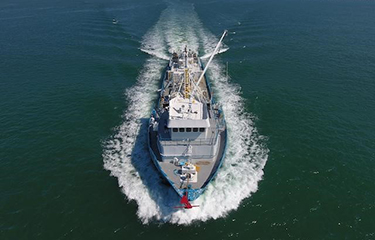An Atlantic State Marine Fisheries Commission panel voted earlier this week to seek a vote of noncompliance for Virginia’s menhaden fishery.
The commission’s Atlantic Menhaden Management Board voted on Tuesday, 28 October, in New Hampshire. It now will be reviewed by the ASMFC’s policy board on Thursday, 31 October.
Even if the commission agrees with the noncompliance finding, it will be up to U.S. Commerce Secretary Wilbur Ross to determine what, if any, action should be taken.
The vote comes a month after Omega Protein alerted the commission that it would exceed the 51,000 metric ton cap placed on fishing for menhaden in Chesapeake Bay. It noted that conditions in the Atlantic Ocean prohibited its fishermen from harvesting fish there safely. At the same time, it said an abundance of the fish were located inside the bay.
"In the last decade, we have made a concerted effort to fish outside the Bay whenever weather conditions and the location of the fish have made that possible," said Monty Deihl, the company’s vice president of operations, who has managed Omega Protein’s Atlantic menhaden fleet since 2010.
The menhaden issue has been a contentious one between the Commission and the state of Virginia. The state’s legislature has failed to codify the reduced 51,000 metric ton cap. In February, the ASMFC voted to table a noncompliance vote, noting that annual harvests in the region since 2012 had been below that threshold.
Meanwhile, the company has insisted the reductions put in place by the ASMFC have not been based on scientific data. For the 2019 season, the Commission established a catch limit of 216,000 pounds. However, only 51,000 could be harvested within the bay.
In 2017, the commission ruled to cut the Chesapeake Bay limit from 87,000 metric tons.
Omega Protein has said that while it has fished over the ASMFC’s limit, its harvest remains under the 87,000-metric-ton cap.
In addition, the company noted that the Marine Stewardship Council has recently certified the Atlantic menhaden fishery, which dates back nearly 150 years, as sustainable.
"The best available science points to a fishery that is healthy and sustainable," said Bret Scholtes, CEO of Omega Protein. "As we have done for many years, we pledge to work with the Atlantic States Marine Fisheries Commission to improve menhaden management, as we move toward ecological reference points."
Omega Protein harvests menhaden in Virginia, the Gulf of Mexico, Canada and Europe to develop fish oils and nutraceutical products.
Photo courtesy of Omega Protein







